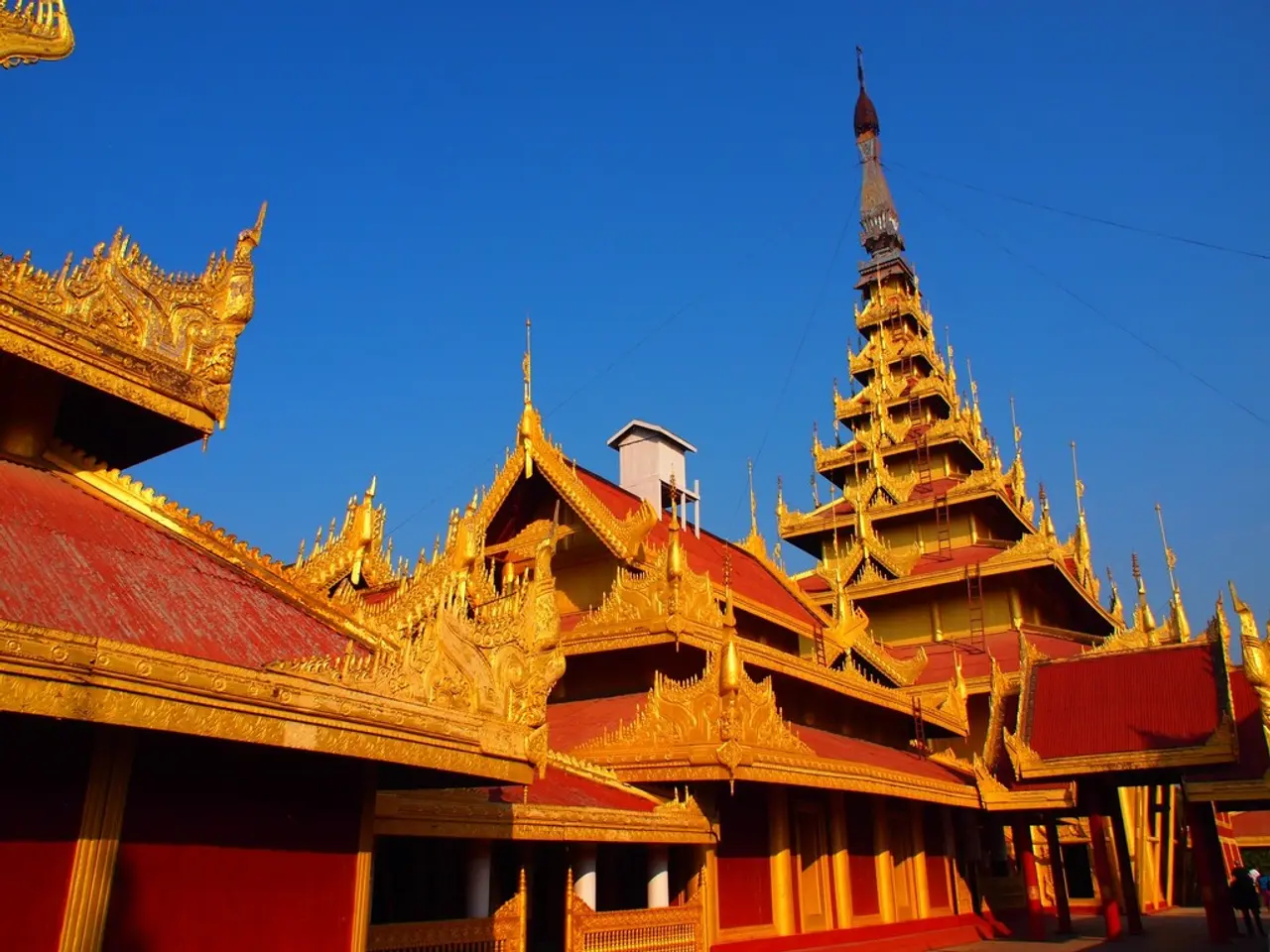Bangladesh plans to reveal democratic transformations in commemoration of revolution anniversary
Bangladesh, a South Asian nation with a population of around 170 million, is currently in the midst of a significant political transition. The interim government, led by Nobel laureate Muhammad Yunus, has proposed a series of democratic reforms aimed at restoring public confidence and stabilizing the country following the ouster of Sheikh Hasina in 2024 [1][2].
The reforms, to be unveiled on August 5, 2025, include the establishment of eleven reform commissions focused on national unity and creating a pathway to elections. The emphasis is on institutional reforms to strengthen democratic foundations and the electoral process [1][2]. However, these reforms have faced significant challenges.
Political polarization remains a major hurdle. The political landscape is divided with disagreement over election timing. Yunus’s government favors April 2026, while opposition parties like the Bangladesh Nationalist Party demand earlier elections in February. This deadlock has led to political paralysis, undermining voter confidence and slowing reform momentum [2].
Moreover, the interim government’s tenure has seen an easing of pressure on Islamist groups previously repressed under Hasina, allowing their resurgence and complicating political stability. The largest Islamist party, Jamaat-e-Islami, is actively seeking government roles, raising concerns that increased Islamist influence might fragment Bangladesh’s political landscape further and potentially catalyze radicalization [3].
The student leaders who initially sparked the uprising have since formed a new political party demanding deep constitutional reforms, including a potential rewrite if necessary, signaling that grassroots calls for change remain unmet by the interim government. Critics and analysts argue the government missed an opportunity to focus decisively on electoral reform and broader democratic transformation, leaving many disappointed about the limited progress [3].
Muhammad Yunus, an 85-year-old Nobel Peace Prize winner, has acknowledged inheriting a "completely broken down" system of public administration. He is working to "build a broad national consensus around a renewed political system - one that delivers inclusive, participatory, and credible elections" [1][2]. The presentation of the "July Proclamation" will take place with the involvement of all political parties that were part of the mass uprising.
The protests in Bangladesh began on July 1, 2024, over a quota system for public sector jobs. Sheikh Hasina, the former leader of Bangladesh, fled to India after a student-led revolt on July 1, 2024. The interim government took over after a student-led revolt ousted the previous autocratic administration on August 5, 2024, ending a 15-year rule [1][2].
The interim government has warned that political power struggles risk jeopardizing the gains that have been made. Efforts to reach agreements have made slow progress as political parties jostle for power ahead of elections, scheduled for early 2026. However, the outcome of these efforts remains uncertain as Bangladesh heads toward elections expected no earlier than April 2026.
References: [1] The Economist. (2025). Bangladesh's interim government unveils democratic reforms. [online] Available at: https://www.economist.com/asia/2025/08/05/bangladeshs-interim-government-unveils-democratic-reforms [2] BBC News. (2025). Bangladesh's interim government unveils democratic reforms. [online] Available at: https://www.bbc.com/news/world-asia-57112952 [3] The Diplomat. (2025). Bangladesh's Interim Government Faces Challenges in Implementing Democratic Reforms. [online] Available at: https://thediplomat.com/2025/08/bangladeshs-interim-government-faces-challenges-in-implementing-democratic-reforms/
- The big-wins for democratic reforms in Bangladesh, proposed by the interim government, are set to be unveiled on August 5, 2025.
- The reforms focus on national unity and a pathway to elections, highlighting institutional reforms to strengthen democratic foundations and the electoral process.
- However, these reforms face significant challenges due to political polarization and disagreement over election timing.
- The political landscape is divided, with the government favoring April 2026 and opposition parties demanding elections in February, a deadlock that leads to political paralysis.
- The resurgence of Islamist groups, such as Jamaat-e-Islami, jeopardizes political stability, as they actively seek government roles.
- The student leaders who initially sparked the uprising have formed a new political party demanding deep constitutional reforms.
- Critics argue the government missed an opportunity to focus on electoral reform and broader democratic transformation, leaving many disappointed.
- Muhammad Yunus, the Nobel laureate leading the interim government, acknowledges the broken public administration system and aims to build a renewed political system.
- The protests in Bangladesh began over a quota system for public sector jobs, leading to the ouster of Sheikh Hasina in August 2024.
- The interim government warns that power struggles risk jeopardizing the gains made since the student-led revolt.
- Despite slow progress in reaching agreements, the outcome of these political power struggles remains uncertain as Bangladesh heads towards elections no earlier than April 2026.
- Other than politics, topics generating general news in Bangladesh include war-and-conflicts, crime-and-justice, accidents, responsible-gambling, and sports.
- In the realm of sports, popular games include football, soccer, basketball, baseball, hockey, golf, tennis, racing, and American football.
- Sports-betting and horse-racing are among the gambling trends in Bangladesh, raising concerns about crime-and-justice and responsible-gambling.
- Weather and weather-forecasting, along with auto-racing and mixed-martial-arts, are additional categories falling under the general-news umbrella in Bangladesh.







